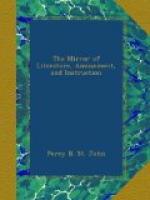Not so with Jack Horner: the very incident recorded in the first line lets us into his character; he is evidently a lover of solitude and of solitary contemplation. He is not, however, a gloomy ascetic; he takes into his corner a Christmas pie, and, while he leisurely gratifies his palate, his mind feasts on the higher luxury of an approving conscience. It has been said that the man who loves solitude must be either an angel or a demon. Horner had more of the former in his composition; he retired from the busy haunts of his playmates not to meditate mischief, but to feast upon the pie, which had probably been given him as a reward for his good conduct, and indulge in the delightful thoughts to which the consciousness of deserving it gave rise. But here it may be objected, why instead of eating his pie in a corner, did he not share it with his companions? The remark is pertinent, but the circumstance only evinces the admirable management of the poet; to represent his hero without a defect would be to outrage nature, and to render imitation hopeless. Horner, it must be admitted, with all his excellence, was too fond of good eating; it is in vain to deny it; his deliberately pulling out a plum with his finger and thumb, shows the epicure, not excited by the voracity of hunger, but evidently aiming to protract his enjoyment. The exclamation which follows savours of vanity; but when his youth is recollected, this will be deemed a venial error, and it must also be considered that his few faults were probably compensated by a constellation of excellencies. This poem has been imitated, (I will not say successfully, for its beautiful simplicity is in fact inimitable,) by one of the greatest statesmen and classical scholars of the present century, Mr. Canning; and it is melancholy to reflect that, while a monument is erecting to the memory of the latter and his name lives in the mouths of men, all traces of that original poet, whose inspirations he sought to imitate, are entirely lost. The lines of Mr. Canning are to be found in his “Loves of the Triangles:”
Thus youthful Homer rolled the roguish
eye.
Culled the dark plum from out the Christmas
pie,
And cried in self applause, how good a
boy am I.
P.Q.
* * * * *
ANECDOTE GALLERY.
* * * * *
GEORGE THE FIRST.
Previously to the King’s arrival in this country, a proclamation had been issued, offering, in case the Pretender should land in any part of the British isles, the sum of 100,000_l_. for his apprehension. At the first masquerade which the King attended in this country, an unknown lady, in a domino, invited him to drink a glass of wine at one of the side-tables; he readily assented, and the lady filling a bumper, said, “Here, mask, the Pretender’s health.”—Then filling another glass, she presented it to the King, who received it with a smile, saying, “I drink, with all my heart, to the health of every unfortunate prince.”




